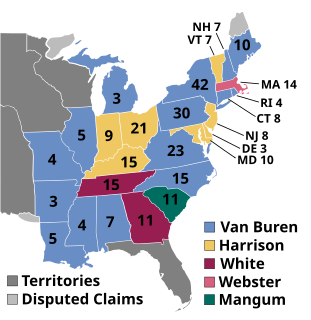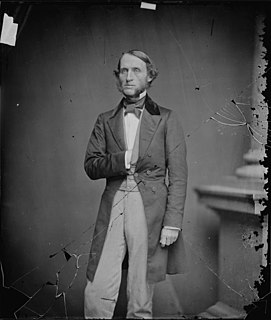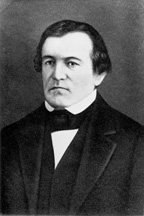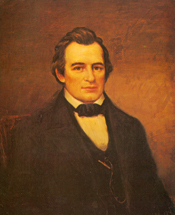
The 1836 United States presidential election was the 13th quadrennial presidential election, held from Thursday, November 3 to Wednesday, December 7, 1836. In the third consecutive election victory for the Democratic Party, incumbent Vice President Martin Van Buren defeated four candidates fielded by the nascent Whig Party.

The 1852 United States presidential election was the 17th quadrennial presidential election, held on Tuesday, November 2, 1852. Democrat Franklin Pierce, a former Senator from New Hampshire, defeated Whig nominee General Winfield Scott.

The Texas annexation was the 1845 annexation of the Republic of Texas into the United States of America. Texas was admitted to the Union as the 28th state on December 29, 1845.

Thomas Lanier Clingman, known as the "Prince of Politicians," was a Democratic member of the United States House of Representatives from 1843 to 1845 and from 1847 to 1858, and U.S. senator from the state of North Carolina between 1858 and 1861. During the Civil War he refused to resign his Senate seat and was one of ten senators expelled from the Senate in absentia. He then served as a general in the Confederate States Army.

John Bell was an American politician, attorney, and planter who was a candidate for President of the United States in the election of 1860.

James Chamberlain Jones was an American politician who served as the Governor of Tennessee from 1841 to 1845, and as a United States Senator from Tennessee from 1851 to 1857. A Whig, Jones twice defeated rising politician James K. Polk for the governorship. He was the first native-born Tennessean to be elected governor.

Isham Green Harris was an American politician who served as Governor of Tennessee from 1857 to 1862, and as a U.S. Senator from 1877 until his death. He was the state's first governor from West Tennessee. A pivotal figure in the state's history, Harris was considered by his contemporaries the person most responsible for leading Tennessee out of the Union and aligning it with the Confederacy during the Civil War.

Spencer Jarnagin was a United States Senator from Tennessee from 1843 to 1847.

James Edmund Bailey was a Democratic United States Senator from Tennessee from 1877 to 1881.

Elections to the United States House of Representatives for the 28th Congress were held during President John Tyler's term at various dates in different states between August 1842 and February 1844.

John Bennett Dawson was an American politician who served as a Democrat in the United States House of Representatives from the state of Louisiana.

The 1837 United States Senate election in New York was held on February 7, 1837, by the New York State Legislature to elect a U.S. Senator to represent the State of New York in the United States Senate.

The 1843 United States Senate election in New York was held on February 7, 1843, by the New York State Legislature to elect a U.S. Senator to represent the State of New York in the United States Senate.
The United States Senate elections of 1852 and 1853 were elections which had the Democratic Party gain two seats in the United States Senate, and which coincided with the 1852 presidential election. Only six of the twenty Senators up for election were re-elected.
The United States Senate elections of 1842 and 1843 were elections which had the Whigs lose seats but maintain control of the United States Senate. Although they lost three seats in the regular elections, they gained two of them back by the start of the first session in special elections.
The United States Senate elections of 1840 and 1841 were elections which, corresponding with their Party's success in the 1840 presidential election, had the Whig Party take control of the United States Senate.
The United States Senate elections of 1838 and 1839 were elections which had the Democratic Party lose seven seats in the United States Senate, but still retain a majority.
The United States Senate elections of 1836 and 1837 were elections that had the Jacksonian coalition emerge as the Democratic Party, and the Adams, or Anti-Jackson, coalition emerge as the Whig Party

John Netherland was an American attorney and politician, active primarily in mid-19th century Tennessee. A leader of the state's Whigs, he served in both the Tennessee Senate and Tennessee House of Representatives, and was an unsuccessful candidate for governor on the Opposition ticket in 1859. During the Civil War, he supported the Union, and was a delegate to the 1861 East Tennessee Convention.
In 1841, Spencer Jarnagin was nominated for U.S. Senator by the Whig caucus in the Tennessee General Assembly. However, some of the Democrats in the legislature decided that no senator would be preferable to a Whig. Known as the "Immortal Thirteen" by Tennessee Democrats, they refused to allow a quorum on the issue.












